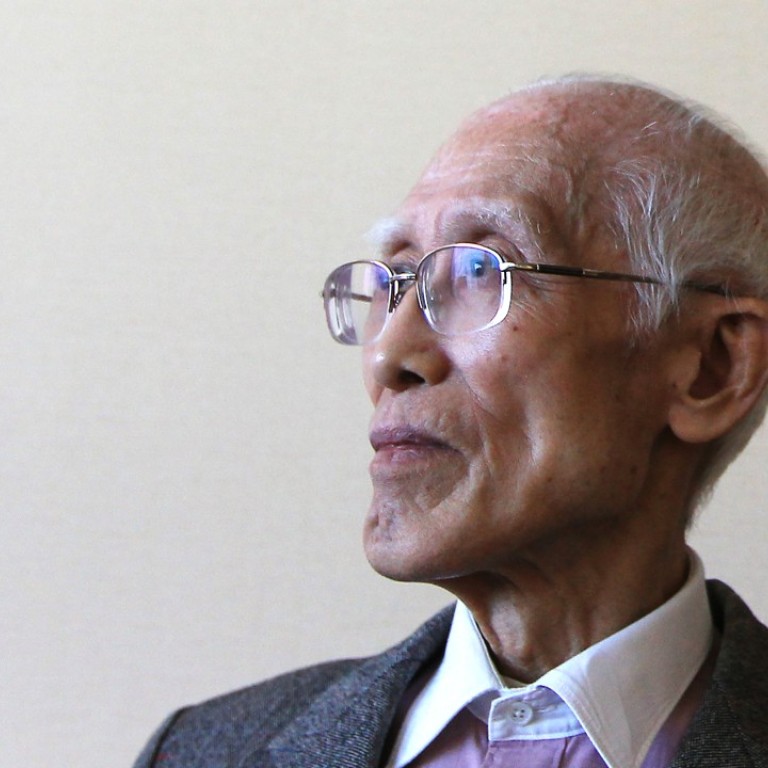
The poet whose works struck a chord with Chinese diaspora and Hong Kong youth in the 1960s
Yu Kwang-chung, who died on Thursday in Taiwan, was also an expert in English literature and a translation master
Yu Kwang-chung (1928-2017)
One of the most influential Chinese-language poets, whose profound but unpretentious verses captured followers from a premier to common folk, has died.
The poet par excellence left behind volumes of poems and essays he wrote, as well as poems he translated into English.
“Yu was in fact an expert in English literature and a translation master, but few know about that. The way he kept a balance as a scholar, a poet and an essayist was remarkable,” his long-time acquaintance, Professor Leo Lee Ou-fan, told the Post.
Lee added: “There’s a saying about Yu that he is capable of writing poems with his left hand and essays with his right hand.”
Why Chinese towns are so keen to lay claim to poets, philosophers and emperors
Born in Nanjing in 1928, Yu spent his first 20 years on the run during the war years with Japan. After the war, he studied English at the University of Nanking and as the civil war intensified, transferred to Xiamen University in his mother’s hometown.
After a brief stay in Hong Kong in 1949, Yu and his family settled in Taiwan the following year. In 1952, he was one of the first graduates in foreign languages at the National Taiwan University. In 1959, he obtained a Master’s of Fine Arts at the University of Iowa.
The 1960s kicked off his productive years in poems and short essays, in addition to him teaching in Taiwan and the United States.
Given his background, Yu’s poems struck a chord with the global Chinese diaspora.
And his literary works had a major impact on Hong Kong youth during the rebellious 1960s.
“His poems were very effective in addressing serious issues in a lively way and that became very popular with the intellectual youth movement in Hong Kong,” said Yau Lop-poon, who grew up during that time and is now chief editor of Yazhou Zhoukan, a Chinese language international affairs magazine.
Poetry star shines light on how to appreciate Chinese culture
“Yu once called Taiwan his wife, Hong Kong his mistress, China his mother, and Europe his another woman,” Yau said.
Lung Ying-tai, Taiwan’s former cultural minister, wrote on Thursday from Vienna: “From exile to settling in a land that sees him as a stranger, the life of Yu Kwang-chung is a painful volume of cultural history that traverses two centuries.”
In his famous poem Homesickness, Yu likened himself to a tiny stamp that he wished could be posted to his motherland. The poem was cited by then premier Wen Jiabao in 2003 during a meeting with overseas Chinese in New York.
In 1974, Yu joined the Chinese language and literature faculty at the Chinese University of Hong Kong, where he stayed until 1985 when he became the dean of arts at National Sun Yat-sen University in Kaohsiung.
“At one point I missed Hong Kong so much that I stood at the waterfront facing the direction to Hong Kong and composed wang hai [Looking across the sea]”, he said as he recited the poem last October, during his last public appearance.
Watch: Poet Yu Kwang-chung’s last public appearance
Fan Sin-piu, an associate professor of Chinese Language and Literature at CUHK, said that during Yu’s years in Hong Kong, he had cultivated many talented individuals who later became prominent figures in the city’s literary arena, including poet and writer Wong Leung-wo.
Yu also produced many works on Hong Kong in the early 1980s, said Fan, who was a student in Yu’s modern literature class at CUHK at the time.
“He spent much time writing about Hong Kong, especially its natural scenery. He loved nature and enjoyed hiking, often exploring the hills with friends or alone,” Fan said.
Before leaving Hong Kong in 1985, Yu wrote a number of essays about his expeditions, including one about Fei Ngor Shan, also known as Kowloon Peak.
“No matter where I have been, or where I will be in the future, my heart will forever linger here,” Yu wrote at the end of the piece, making a silent promise to the wind as he stood on the precipice overlooking Sai Kung Peninsula, Ma On Shan peak, the mountain range of Pat Sin Leng and, at last, the CUHK campus.
Additional reporting by Nectar Gan

